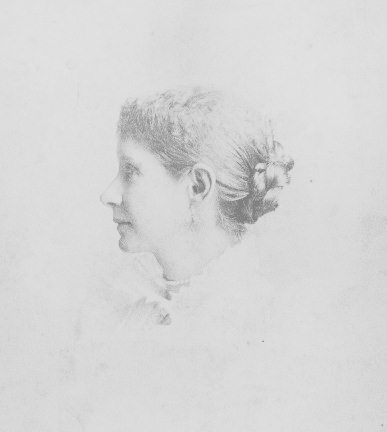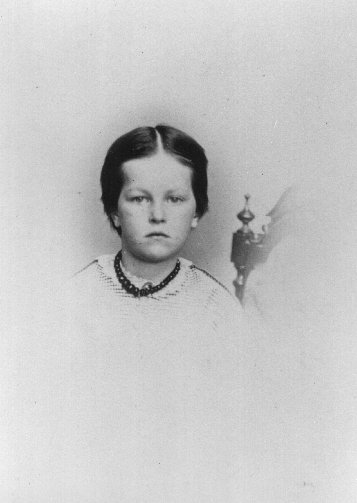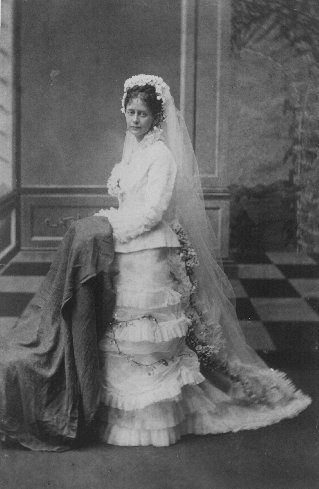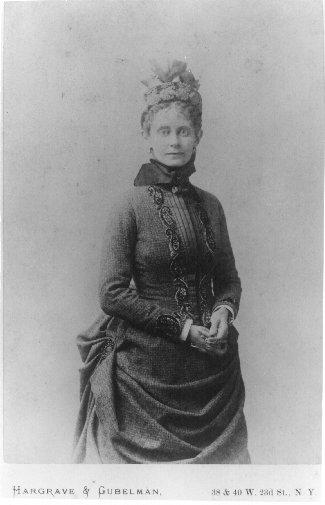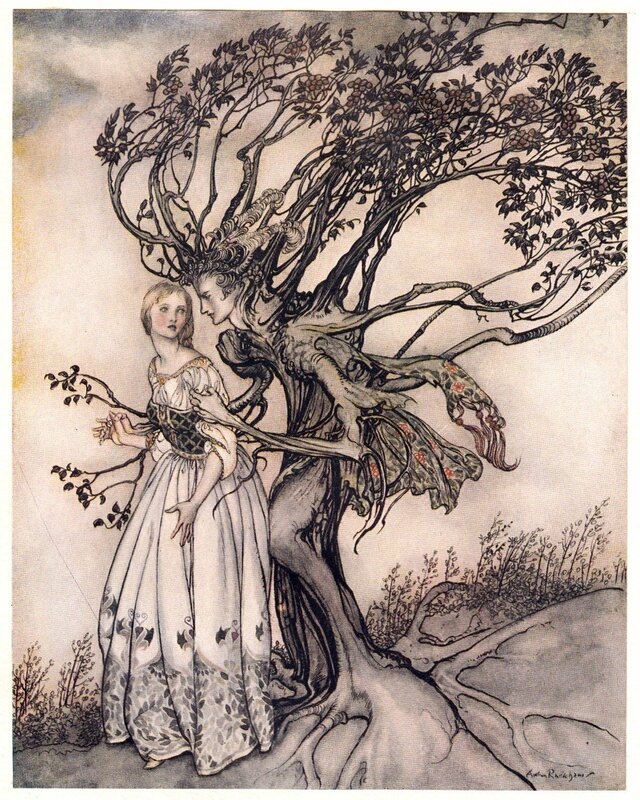Danske Bedinger Dandridge
Poetry and Writings of Danske Dandridge
[In 1925, Ella Mae Turner, Head of the English Department of Shepherd College in Shepherdstown West Virginia compiled and edited, with biographical sketches, stories and verse of West Virginia poets. The biographical sketch and review of Danske Dandridge's poetry is given below from Ms. Turner's book. Other notable West Virginia poets featured in Ms. Turner's book include Bedinger descendants Edwin Gray Lee, Daniel Bedinger Lucas, Virginia Bedinger Lucas and Virginia Lucas.]
Caroline Dane (Danske) Bedinger was the daughter of Hon. Henry Bedinger and Caroline Lawrence, both of whom were members of distinguished families. She was born in Copenhagen, November 19, 1854, while her father was United States Minister to Denmark. She was called Danske, little Dane, in the language of her birthplace. When she was three years old, her parents returned to America where her father shortly died. Danske and her two siblings were reared by her mother, first near her grandfather, Hon. John V. Lawrence of Flushing, on Long Island. Her mother moved her family to Shepherdstown where she purchased "Poplar Grove." Danske was educated privately and was graduated with the highest honors from a well-known school in Staunton, Virginia. On May 3, 1877 she married Hon. A. S. Dandridge and soon moved to "Poplar Grove," which she renamed "Rose Brake", and which remained her home until her death on June 4, 1914. Here she wrote 'poems that appeared in The Independent, Harper's, The Century and other magazines, and that won for her recognition in the literary world. Her verse received the commendation of Lowell and Holmes and also Whittier who used an example of her work in his "Songs of Three Centuries." Edmund Clarence Stedman also appreciated her poems and included "The Dead Moon" and "The Spirit of the Fall" in his "American Anthology.”
Mrs. Dandridge's collected poems appeared in "Joy and Other Poems" and "Rose Brake,” both of which are now out of print. "Joy and Other Poems “which was first published in 1888 and an enlarged second edition was published in 1900..
Mrs. Dandridge is a nature poet whose delicacy of fancy and charm of expression have won the admiration of her readers. She excels in the gift of fitting nature to human moods and feelings.
Doctor Waitman Barbe says of Mrs. Dandridge: “But she is not a nature poet at all in the sense which that word has carried since the time of Wordsworth; she is the poet rather of nature’s blossoms and birds and moonlight mysteries. To the laureate of elf-land and of rose-land requires a delicate touch, and hers is both delicate and sure. She is master of her art as well as of her elves, and her verses are metrically considered almost faultless. Such exquisite workmanship is a delight. If a rose is her theme, the poem embodying it is a s perfect as a rose. Her song sparrows and her thrushes never sing our of rhyme.”
Douglas Sladen says: "To my mind almost the most poetical among young poetesses are Danske Dandridge and Helen Gray Cone. Their style and choice of subjects are quite different but both have the genuine note-are really songbirds. Both are happy and ingenious in their metre and fresh in their feeling."
From 1904 until 1909, Mrs. Dandridge devoted most of her time to writing for garden magazines. "Spireas for Foliage Effects," "Old Monarch of Tulip Trees," "American Viburnums," and "My Garden from Day to Day," a serial, were published in Country Life in America and in The Country Calendar.
She was also the author of valuable historical works including "George Michael Bedinger, a Kentucky Pioneer," "Historic Shepherdstown," and "American Prisoners of the Revolution,” all of which show painstaking and scholarly research on the part of the author and are distinguished for their clear and interesting style.
[In 1925, Ella Mae Turner, Head of the English Department of Shepherd College in Shepherdstown West Virginia compiled and edited, with biographical sketches, stories and verse of West Virginia poets. The biographical sketch and review of Danske Dandridge's poetry is given below from Ms. Turner's book. Other notable West Virginia poets featured in Ms. Turner's book include Bedinger descendants Edwin Gray Lee, Daniel Bedinger Lucas, Virginia Bedinger Lucas and Virginia Lucas.]
Caroline Dane (Danske) Bedinger was the daughter of Hon. Henry Bedinger and Caroline Lawrence, both of whom were members of distinguished families. She was born in Copenhagen, November 19, 1854, while her father was United States Minister to Denmark. She was called Danske, little Dane, in the language of her birthplace. When she was three years old, her parents returned to America where her father shortly died. Danske and her two siblings were reared by her mother, first near her grandfather, Hon. John V. Lawrence of Flushing, on Long Island. Her mother moved her family to Shepherdstown where she purchased "Poplar Grove." Danske was educated privately and was graduated with the highest honors from a well-known school in Staunton, Virginia. On May 3, 1877 she married Hon. A. S. Dandridge and soon moved to "Poplar Grove," which she renamed "Rose Brake", and which remained her home until her death on June 4, 1914. Here she wrote 'poems that appeared in The Independent, Harper's, The Century and other magazines, and that won for her recognition in the literary world. Her verse received the commendation of Lowell and Holmes and also Whittier who used an example of her work in his "Songs of Three Centuries." Edmund Clarence Stedman also appreciated her poems and included "The Dead Moon" and "The Spirit of the Fall" in his "American Anthology.”
Mrs. Dandridge's collected poems appeared in "Joy and Other Poems" and "Rose Brake,” both of which are now out of print. "Joy and Other Poems “which was first published in 1888 and an enlarged second edition was published in 1900..
Mrs. Dandridge is a nature poet whose delicacy of fancy and charm of expression have won the admiration of her readers. She excels in the gift of fitting nature to human moods and feelings.
Doctor Waitman Barbe says of Mrs. Dandridge: “But she is not a nature poet at all in the sense which that word has carried since the time of Wordsworth; she is the poet rather of nature’s blossoms and birds and moonlight mysteries. To the laureate of elf-land and of rose-land requires a delicate touch, and hers is both delicate and sure. She is master of her art as well as of her elves, and her verses are metrically considered almost faultless. Such exquisite workmanship is a delight. If a rose is her theme, the poem embodying it is a s perfect as a rose. Her song sparrows and her thrushes never sing our of rhyme.”
Douglas Sladen says: "To my mind almost the most poetical among young poetesses are Danske Dandridge and Helen Gray Cone. Their style and choice of subjects are quite different but both have the genuine note-are really songbirds. Both are happy and ingenious in their metre and fresh in their feeling."
From 1904 until 1909, Mrs. Dandridge devoted most of her time to writing for garden magazines. "Spireas for Foliage Effects," "Old Monarch of Tulip Trees," "American Viburnums," and "My Garden from Day to Day," a serial, were published in Country Life in America and in The Country Calendar.
She was also the author of valuable historical works including "George Michael Bedinger, a Kentucky Pioneer," "Historic Shepherdstown," and "American Prisoners of the Revolution,” all of which show painstaking and scholarly research on the part of the author and are distinguished for their clear and interesting style.
|
"She is about five feet two inches in height, slender figure, carries herself very gracefully, has a very small head, beautiful brown soft hair, dark complexion, gray eyes; soft, low voice, very sweet and full of feeling and a quiet, low but very casual laugh; her eyes are very expressive and in constant use. Prefers Thackeray, Dickens, Jean Ingelow, Tennyson, Longfellow. . . Evidently has a quick temper, but is generally of an easy disposition. . . .but full of Mischief."
The quotation above is Danske Dandridge's own sly self-description written in her diaries now held in the Bedinger and Dandridge Family Papers at the David M. Rubenstein Rare Book & Manuscript Library Collection at Duke University. This quotation was retrieved from the archives and quoted by James Surkamp. A selection of Danske's poems and writings can be viewed on line in the website, "Immortal Essence: "The Life and Writings of Danske Dandridge, Poet and Nature-Lover," written and assembled by James Surkamp of Shepherdstown, West Virginia.
|
Danske Dandridge's first volume of poetry "Joy and Other Poems" was published by G. P. Putnam's Sons in 1888. The Spirit of Jefferson carried the announcement of the publication in the issue of July 31, 1888 with excerpts of articles from Literature Magazine and Boston Advertiser with two stanzas of her poem "The Spirit and the Wood-Sparrow", which is printed in full below:
|
The Spirit and the Wood-Sparrow
“ ‘T was long ago: The place was very fair; And from a cloud of snow A spirit of the air Dropped to the earth below, It was a spot by man untrod,-- Just where I think is only known to God. The spirit for a while, Because of beauty freshly mad, Could only smile: Then grew the smiling to a song, And as he sang he played Upon a moonbeam-wired cithole, Shaped like a soul. There was no ear Or far or near Save one small sparrow of the wood That song to hear. This, in a bosky tree, Heard all, and understood As much as a small sparrow could By sympathy. ‘T was a fair sight-- That morn of spring When, on the lonely height, The spirit paused to sing, Then through the air took flight, Still lilting on the wing. And the shy bird, Who all had heard, Straightway began To practice o’er the lovely strain, Again, again; Though indistinct and blurred, He tried each word, Until he caught the last far sounds that fell, Like the faint tinkle of a fairy bell. Now, when I hear that song, Which has no earthly tone, My soul is carried with the strain along To the everlasting Throne, To bow in thankfulness and prayer, And gain fresh love, and faith, and patience there. Danske Dandridge WINGS
Shall we know in the Hereafter All the reasons that are hid? Does the butterfly remember What the caterpillar did; How he waited, toiled, and suffered To become the chrysalid? When we creep so slowly upward; When each day new burden brings; When we strive so hard so conquer Vexing sublunary things-- When we wait, and toil, and suffer, We are working for our wings. Danske Dandridge |
|
The Struggle
|
“Body, I pray you, let me go!”
(It is a Soul that struggles so.) “Body, I see on yonder height Dim reflex of a solemn light; A flame that shineth from the place Where Beauty walks with naked face: It is a flame you cannot see,- Lie down, you clod, and set me free." “Body, I pray you, let me go!” (It is a Soul that striveth so.) “Body, I hear dim sounds afar Dripping from some diviner star; Dim sounds of holy revelry: It is my mates that sing,and I Must drink that song or break my heart;- Body, I pray you, let us part. |
“Comrade, your frame is worn and frail,
Your vital force begins to fail; I long for life, but you for rest, Then Body, let us both be blest. When you are lying ‘neath the dew I’ll come, sometimes, and sing to you; But you will feel nor pain nor woe,- Body, I pray you, let me go.” Thus strove a Being: Beauty-fain, He broke hisbonds and fled amain. He fled: the Body lay bereft, But on itslips a smile was left, As if that Spirit, looking back, Shouted upon his upward track, With joyous tone and hurried breath, Some message that could comfort Death. Danske Dandridge |
Nine of Danske Dandridge's poems have served as the lyrics for songs composed and recorded by Terry Tucker of Shepherdstown, West Virginia. One of these poems, The Struggle, is given above; the ohter eight poems are given below. The songs can be accessed at her website.
|
SYMPATHY
Poem by Danske Dandridge, set to music by Terry Tucker We talked together, you and I; It was a queenly night in June; Low hung the moon in yonder sky, And on your cheek low glanced the moon. Your gentle hand was mine to hold: My ill-fed heart began to speak; And ever, as the tale was told, Dear friend, the moon was on your cheek. Old loss that would not let me rest, Old grief that slept, but ever lay A languid load upon my breast, Awoke, and wept themselves away. Up climbed the moon; slow waned the night; And still you bent to hear me speak; I drank the comfort of the light In those bright tears upon your cheek. From off my life the burdens fall: Still in their grave through tranquil years They rest, those weary sorrows, all, That faded in the light of tears. THE STREAM AND I
Poem by Danske Dandridge, Set to music by Terry Tucker We ramble on, the stream and I, Still singing, still companionless. We run to find, beneath the sky, Some arid spot, some life to bless. The brook is dreaming of the sea; But I, fond spirit, dream of thee. The brook's bright waters flow and flow; All lush and green his track appears; And it is given me to know Some choral of the chanting spheres. Our lives are tuneful as the birds, With rippled song and gentle words. And if, sometimes, we lurk apart In secret grot or covert dale, To bide a space and gather heart, Anon we're laughing down the vale. Though rain or tears our forces swell, We find the sun and all is well. WINGS
Poem by Danske Dandridge, set to music by Terry Tucker Shall we know in the Hereafter All the reasons that are hid? Does the butterfly remember What the caterpillar did? How he waited, toiled, and suffered To become the chrysalid. When we creep so slowly upward; When each day new burden brings; When we strive so hard so conquer Vexing sublunary things-- When we wait and toil and suffer, We are working for our wings. |
THE FAIRY CAMP
Poem by Danske Dandridge, set to music by Terry Tucker What did I see in the woods, to-day? I saw a fairies' gipsy-camp. The tents were toadstools, brown and gray, Among the bracken, soiled and damp. I called on a cowslip 'mid the green, And borrowed a bit of fairy gold, And then I found the Gipsy-Queen, And so I had my fortune told. Ah, yes, she told me a secret true, That wild-eyed gipsy, brown and red! But I may not tell it out to you, For that would break the charm, she said. And if you seek them by yourself You will not find that strolling band; They have pilfered the wild bees' hoarded pelf, And flitted away to another land. FOLLY-LAND Poem by Danske Dandridge, set to music by Terry Tucker In Folly-land what witchery! What pretty looks, what eyes there be; What gamesome ways; what dimpled smiles; What lissome limbs; what frolic wiles; What easy laughter, fresh and clear; What pranks to play; what jests to hear! Old Time forgets to shake his sand; The days go tripping, hand in hand, In Folly-land, in Folly-land. In Folly-land, one idle hour, The moonlight had a wizard power; Its eerie glamour turned my brain—: (I would that I were there again!) We stood together, 'neath the sky: A bird was chirping drowsily: He smiled, he sighed, he held my hand. Ah me! Ah well! we understand 'T was Folly-land, 't was Folly-land. My sober friend, how worn your looks! Your heart is in your mouldy books. Here's half a cobweb on your brow! I seldom see you jovial now. Fling down your volumes and be free To take a pleasure-trip with me. Come, “Here's my heart, and here's my hand!” We'll launch our skiff and seek the strand Of Folly-land, of Folly-land. |
|
DREAMS
Poem by Danske Dandridge, set to music by Terry Tucker Run with me, elves, and lay me on that bed Bud-strewn beneath my cirque of sister trees, Wherethrough the young Moon hath embroidered Faint soothing-spell in silver traceries; Run with me, for I feel the need of dreams; Earth palls, and naught is fair but that which seems. Fashion thin horns of blossom-tubes and blow; Tinkle the lucent pebbles of the rill; Fetch me a mating bird to twitter low; Spin sounds of night, fine-drawn, remote and shrill; And let that elfin whom I hold most dear Whisper a certain name within mine ear. Then, while I sleep, the very tender Moon Ne'er dreamed such sport with her Endymion, Nor any love-rapt mortal, late or soon, Such snatch of rapture from the Immortals won As I, that, waking, have become so dull, But in my dreams, so glad and beautiful. |
HOPE
Poem by Danske Dandridge, set to music by Terry Tucker Ah me! what battles I have fought! I would I knew the rune that lays The swarming shades of weary days That take the lonely House of Thought! A restless rabble, unsubdued; A wild and haggard multitude; Distorted shapes that spring from tears, And torments born of wedded fears. Sometimes, amid the changing rout, A rainbowed figure glides about, And from her brightness, like the day, The whimpling shadows slink away. I know that lyre of seven strings; The seven colors of her wings; The seven blossoms of her crown; - There violets twine for amethyst; Small lilies white as silk-weed down; There myrtle sprays her locks have kissed; And pansies that are beryl blue; And varied roses, rich of hue; With iridescent loving eyes Of buds that bloom in Paradise. Come often, thou eternal child, New-string thy lyre and sing to me. Thy voice ecstatic, fresh and wild, Enthralls each dark-browed phantasy. Beyond the walls she bids me peer To see a Future, dim and dear; Sweet faces shining through the mist Like children waiting to be kissed; A lovely land that knows not pain; Atlantis land beyond Life's main, Where we who love may love again - Ah me! is this beyond the plan Of God's beneficence to man? |
THE PRELUDE
Poem by Danske Dandridge, set to music by Terry Tucker
What is astir where the shadows are dense?
Something that baffles the curious sense;
Something that shimmers and whispers and sighs;
Something that glimmers to far-reaching eyes;
The Shape of a song, or the Soul of a stream,
Or a Being awake from a beautiful dream,
Is pulsing and stirring and making prelude
In the reverent heart of the reverent wood.
Is it a word that I never have heard?
Is it a hint of a jubilant bird
That never was hinted before?
Oh! what can it be that is new in the wood;
That thrills with its meaning, but half understood,
A rapture and more?
A sound is created that never the breeze
Has carried till now through the city of trees;
Fresh tidings from God; a new message is sent
Through I know not what delicate instrument.
And I would I had senses as fine as a sprite,
To hear and interpret the message a-right:
But I think, oh, I think, as I fall on my knees,
God is walking and talking again 'mid the trees.
|
To My Comrade Tree Remote in woods where thrushes chant;
Or on some lonely mountain slope; Or in a copse, the cuckoo's haunt- With fingers pointing to the cope, There stands a tree, there stands a tree, Must fall before they bury me. O waiting heart, where'er thou art, At last thy dust with mine shall blend; For though we spend our days apart, We come together at the end; And thou with me, and I with thee, Must lie in perfect unity. Within a cramped confine of space, And owing naught of earth beside, That heart must be my dwelling-place For whom the world was not too wide. A new-time Dryad, mine must be The shape that shall inhabit thee. Perchance in some lone wandering On thine old roots I may have lain, And heard above the wood-birds sing. While God looked down upon us twain; And did I feel no thrill, with thee, Of Friendship and sympathy? Is thy strong heart ne'er wearied out With standing 'neath the overfreight Of boughs that compass thee about, With mass of green, or white, a-weight? O patient tree, O patient tree! Dost never long for rest, like me? I know thou spreadest grateful shade When fierce the noontide sun dost beat; And birds their nests in thee have made, And cattle rested at thy feet: Heaven grant I make this life of mine As beautiful and brave as thine! And when thy circling cloak is doffed Thou standest on the storm-swept sod And liftest thy long arms aloft In mute appealing to thy God; Appeal for me, appeal for me, That I may stand as steadfastly. Let me fulfil my destiny And calmly wait for thee, O friend! For thou must fall, and I must die, And come together a at the end- To quiet slumbering addressed; Shut off from storm ; shut in for rest. Thus lying in God's mighty hand While His great purposes unfold, We'll feel, as was from Chaos planned, His breath inform our formless mould; New shape for thee, new lie for me, For both, a vast eternity. |
Illustration by Arthur Rackham, 1917 edition of Brothers Grimm fairy tales
|
